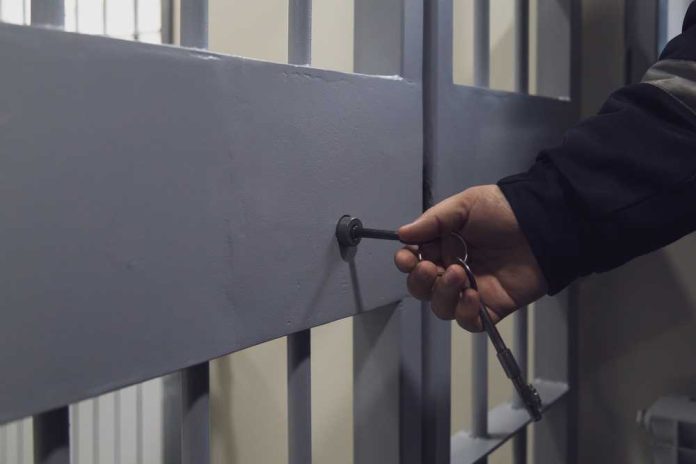
The alleged co-conspirator in the California fertility clinic bombing mysteriously died in federal custody, raising troubling questions about what really happened to Daniel Park at the Los Angeles Metropolitan Detention Center.
Key Takeaways
- Daniel Park, 32, died in federal custody just weeks after being arrested for his role in supplying materials for the May 17 fertility clinic bombing in Palm Springs
- Park was found unresponsive in his cell at the Los Angeles Metropolitan Detention Center with no cause of death provided and no injuries to other inmates or staff
- Park and bomber Guy Edward Bartkus were connected through “anti-natalist” online forums where they shared beliefs that human procreation is unethical
- Park allegedly shipped 180 pounds of ammonium nitrate to Bartkus and purchased an additional 90 pounds shortly before the explosion
- The bombing, which killed Bartkus and injured four others, was described as potentially the largest bomb scene in southern California
Suspicious Death in Federal Custody
Daniel Park, the 32-year-old man charged with aiding in the bombing of a California fertility clinic, has died under mysterious circumstances while in federal custody. Officials at the Los Angeles Metropolitan Detention Center discovered Park unresponsive in his cell just weeks after his arrest. Despite being rushed to a hospital, he was pronounced dead upon arrival. The Bureau of Prisons has yet to provide any explanation for his sudden death, and notably, no other inmates or detention center employees were reported injured, raising questions about the circumstances surrounding his demise.
Park’s death adds another layer of complexity to an already disturbing case involving targeted violence against a fertility clinic. Federal authorities arrested Park at New York’s JFK airport in early June after he was extradited from Poland, where he had fled just four days after the bombing. The timing of his death, coming so soon after his capture and before a full investigation could be completed, will undoubtedly fuel speculation about what information might have died with him.
Daniel Park, the Washington man who was charged with providing large amounts of chemicals used in a car bomb outside a fertility clinic in Palm Springs, California, last month, died on Tuesday while in federal custody, according to the Department of Justice.
Park, 32, was found…
— 𓂀 𝕋𝔼𝔸ℍ 𓂀 (@TeahCartel) June 24, 2025
The Bombing Plot and Anti-Natalist Ideology
According to federal prosecutors, Park played a crucial role in the May 17 bombing of the American Reproductive Centers fertility clinic in Palm Springs. He allegedly supplied bomber Guy Edward Bartkus with approximately 180 pounds of ammonium nitrate in January and purchased an additional 90 pounds shortly before the attack. Park’s involvement wasn’t limited to supplying materials; evidence suggests he traveled to California months before the bombing to experiment with explosive compounds in Bartkus’s garage, demonstrating a deliberate and calculated approach to planning the attack.
The investigation revealed that Park and Bartkus connected through fringe online forums where they shared “anti-natalist” beliefs – the philosophical position that human procreation is inherently unethical. This extremist viewpoint motivated their targeting of a fertility clinic. In a disturbing audio recording posted before the bombing, Bartkus expressed anger at efforts to bring life into the world and declared he was not a “life-addict,” providing clear evidence of the ideological motivation behind the attack.
The Explosion and Aftermath
The bombing on May 17 resulted in the death of Bartkus himself, who was killed in the blast he orchestrated. Four additional people were injured in the explosion, though fortunately, the clinic was closed at the time, preventing what could have been a much higher casualty count. Federal authorities labeled the attack as terrorism and described it as potentially the largest bomb scene in southern California. The blast caused significant damage to the facility, though investigators confirmed no embryos were damaged in the explosion.
Investigators discovered that Bartkus had consulted an AI chat application about explosives and mixtures just days before Park visited him in January, highlighting how readily available those with violent intentions can misuse artificial intelligence tools. The role of technology in facilitating this attack raises serious concerns about the need for better safeguards and monitoring of potentially dangerous online activities, especially when they involve explicit discussions of creating explosive devices.
Unanswered Questions
Park’s sudden death leaves many questions unanswered about the full extent of the conspiracy and whether others might have been involved. He was officially charged with providing and attempting to provide material support to terrorists, serious federal charges that could have resulted in decades of imprisonment if convicted. Now, with his death, any information he might have provided about the plot, his motivations, or potential co-conspirators may never come to light.
The death of Daniel Park in federal custody represents a significant setback for investigators seeking to understand the scope of this domestic terrorism plot fully. The timing is particularly suspicious, occurring just weeks after his arrest and before he could face trial or potentially provide additional information about the attack. While authorities continue their investigation, this case serves as a sobering reminder of the very real threat posed by extremist ideologies and the individuals willing to commit violence in service to those beliefs.



